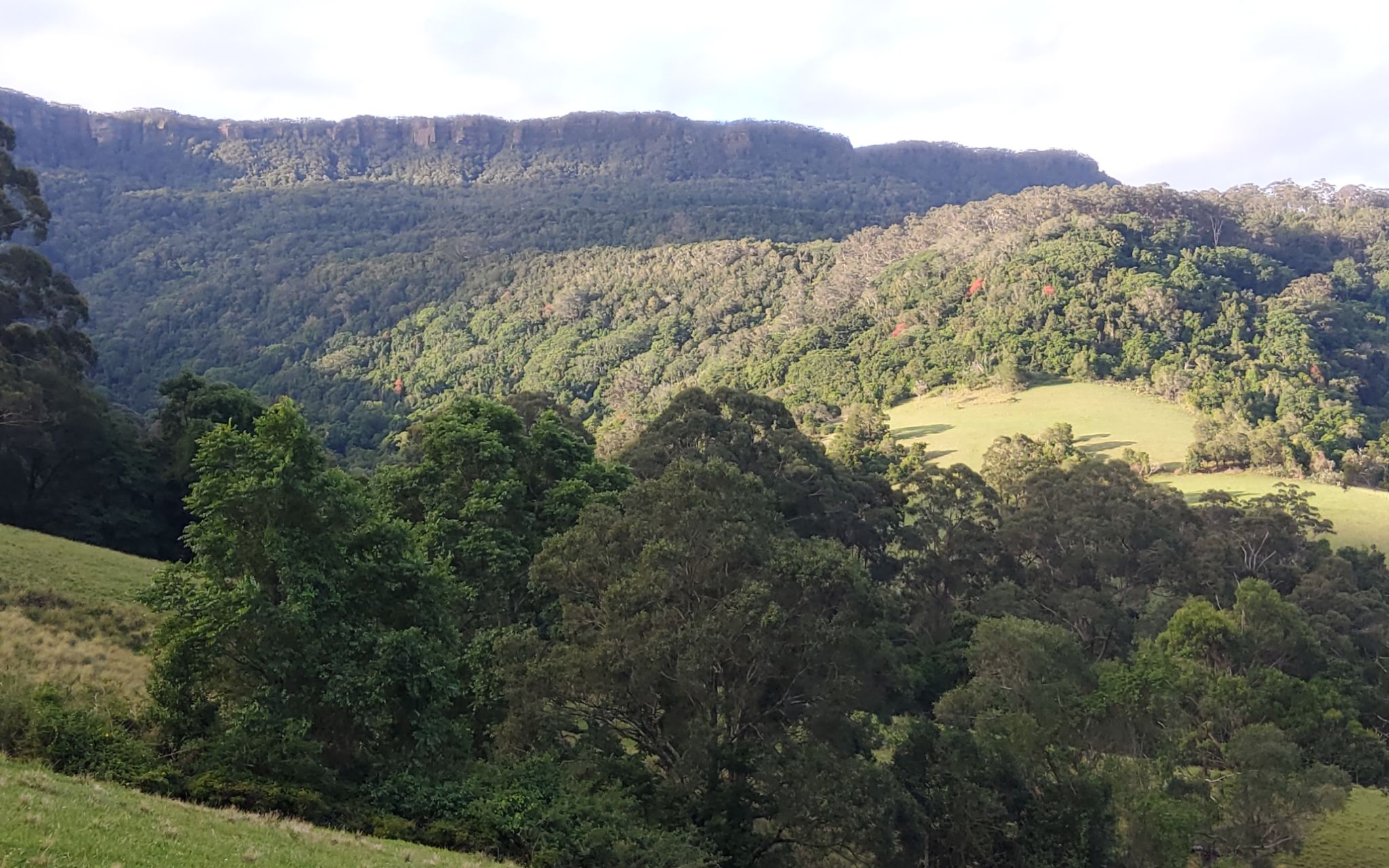Raiding fruit orchards in Foxground a dangerous pursuit
Mark Emery
16 July 2025, 11:00 PM
 Photo: Robyn Sharp collection.
Photo: Robyn Sharp collection.Clive Emery wrote an amusing story of farmers protecting their fruit orchards in Foxground. This was a common story everywhere many years ago. A big thank you to Robyn Sharp who is an artist in Foxground, for the kind permission she gave for some of her works to be used with this story.
Today is the 60th anniversary of an amusing event that took place in Foxground in which I played a somewhat minor role, yet in retrospect was sufficient for all our family to have a great laugh over the breakfast table next morning, as Dad revealed the outcome of my discovery that fruit robbers were in action in the orchard next door.
In the Gerringong and Kiama area, many stories are told of people who made a practice of raiding neighbours' orchards for the fun or hell of it.
Their successes and bravado, while admired by their peers, left doubts in the minds of their austere parents and guardians, for their antics reflected on their upbringing and caused a mark of disapproval on their social calendar.
In those early days in our districts, farmers by habit and necessity always developed an orchard for the provision of extra sustenance for their usually large families, as well as taking prizes.
Beating your neighbour at the Kiama annual shows with your very own fruit, though minor in monetary terms, left a distinct aura of self-importance to the winner.
Some orchards extended over an acre and had more than a dozen varieties of fruit trees, and today, although the homes and their owners have gone, the spot is identified by a few common lemon trees still bearing fruit after a century and a bit of existence.
They still exist as the “rubbing-post” for cattle, and a nesting place for wagtails and wrens.
The remains of stone walls that provided the fencing of the orchard, although devoid of trees today, may be found overgrown with blackberry and lantana - introduced species like the common lemon itself.
The fruit-fly was not in evidence and the fruit was late and juicy, and the trees excelled in the rich red loam of basaltic nature. It was not uncommon for the enterprising to hawk the excess fruit around the town or sell it to local purveyors of fruit and vegetables - Jack Atkins of later fame being one in particular.
The wives of those farmers were not idle in the fruiting season and pantry shelves were laden with bottles of preserves of unlimited variety for family use.
It was therefore encouraged to fence off the tree enclosure, for swine are not averse to eating fruit, and as they were always included in the farm stocking for more reasons than one, the excess of both products were always added to their diet, so by common consent nothing went to waste.
One such farmer who employed a local lad to help him with fencing a larger plot to increase production by more than double, had a suspicion that his fruit was being plundered, so he devised a method for the protection of his crop.
He re-employed the lad to assist him. Painstakingly, they erected a trip-string around the entire orchard fence, and having trussed a 12-gauge shotgun to a post, by the use of a pulley were able to pass one end of the string around the trigger of the fowling-piece.
The trap was set, and the gun loaded with a black powder cartridge which should not only fire its portion of shot, but would also emit much smoke and sparks into the night air to deter intruders and also warn him of their presence.
For the next three nights around midnight the gun went off, and three times the old chap was drawn from his bed in his nightshirt to claim the intruders, but none was there to be found.
Each time he reloaded the gun, and discovered during the engagement of the shortening of the string by inches, then it dawned on him that the nightly dew had shrunk it, so more was added to compensate.
Each day he told the lad of the problem with the gun, and together they believed they discovered the secret of success.
Unknown to the old chap his workmate was one of the nightly fruit-pickers who warned his mates of the danger, and they laid off for a while at his behest.

Photo: Robyn Sharp collection.
For four nights the gun was silent and the farmer knew his assumption was correct.
On the fifth night the unscrupulous lad collected his mates and carefully instructed them in the manner of evading the trip-string, and they had their fill of fruit while the farmer slept.
Around midnight, with all safely hidden in the bushes to escape the light of the moon, the more daring pulled the trip-string and the gun boomed forth its deadly charge quite harmlessly, and the old chap came running an and eerie figure in white night-shirt to search helplessly for the body he hoped to find!
Twice they did this trick, and tiring of it sought another farmer's orchard for the escapades - to this day a wallaby got the blame for tripping the string!
On other nights the tricksters attended the Young Men's Improvement Society in the Oddfellow's Hall!
But back to the 60th anniversary event.
Our farm of 'Sivan' in the Foxground Valley had two houses upon it. The first was our own dwelling situated beside the Valley road, while the second was separated by a sharp gully.
It had been built for the factory manager, but with the closing of the Fresh Food & Ice Co Factory in 1928, the house was lying empty. So Dad engaged Horace Benny to replace the Malthoid roofing with corrugated iron.
Upon its completion the Foxground schoolmaster, Hory Kemp, who lived in Gerringong and had to daily traverse the four miles on a push bike or Metz car, made enquiries of Dad re its availability for renting, which was duly organised.
This enabled him to walk the short distance to the school upon sealing the deal.
During the occupation of the previous tenant, Ted Winney, in his managerial role, a substantial orchard was established on the block, and was in full production upon the arrival of Hory and his family.
As a teacher he was entitled to four weeks' holiday over Christmas when the orchard was in full production with delicious peaches abounding.
Two in particular were a slipstone Elberta and a white-fleshed clingstone Sharhai, both of quality flavour. During his holiday we feasted on the fruit at his request, a very satisfactory arrangement.
One night about the middle of January when I was training for sports, I imagined there was movement in the orchard, so I kept watch each night to make sure and when I saw a flashlight my suspicions were proven.
I came home and told Dad and he advised me to get the shotgun and two cartridges for him, and he would give the thieves a surprise. Mother was against the idea, fearing someone might get hurt, but Dad assured her he would shoot discriminately, and marched off into the darkness with the gun.

Photo: Robyn Sharp collection.
It was not long after when we heard 'Boom! Boom!' a couple of seconds apart. When Dad appeared with the empty gun he was full of humour.
“I'll bet there'll have to be some washing done when those two fellows get home tonight! One fellow fell out of the tree, and in their hurry they both fell over the fence.
“I heard one say ‘he must have been shooting at flying-foxes' but they cleared out and didn't come back. Foolish fellows - had they come and asked, there's enough fruit to feed all Foxground.”
He gave me the gun to put away and went off to bed.
Next day, we went over to investigate. Sure enough, there was the broken limb, and a bit of fence to repair, but the best was the two buckets of peaches they had left behind.
It was very thoughtful of them Dad opined, the best of the pickings! We patched the fence where they fell over.
Clive told me a story once about a lady who lived next door to Gerringong Public School and had a beautiful orchard.
Before school some students climbed the fence to help themselves. The lady came out with a shotgun, loaded it with saltpeter and shot them on a fleshy part of the back of their body.
The principal knew who the culprits were as they could not sit down at their desk for a week.
NEWS




